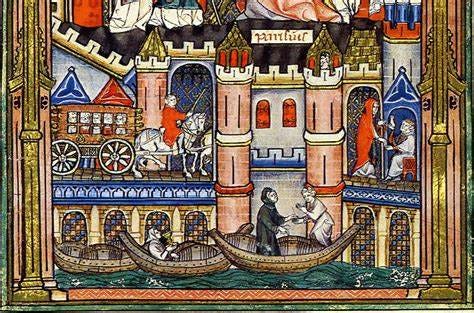INTRODUCTION TO THE SERIES ON GUILD CORPORATISM
PART ONE: GUILDS, OLD AND NEW
Index to the series:
PART TWO: CORPORATISM IN FEASTS, CRAFTS, AND BENEVOLENCE
PART THREE: COMPLEXITIES OF THE GUILDS IN MEDIEVAL LEGAL PLURALISM
PART FOUR: GUILDS AND THE POLITICS OF MEDIEVAL TOWNS
PART FIVE: GERMAN REFORMATION AND GUILDS (AND THE SCHOLARLY LACUNA, AGAIN)
PART SIX: AFTER NAPOLEON; BEYOND HITLER
PART SEVEN: THE PHILOSOPHERS AND GERMAN CORPORATISM
PART EIGHT: THE CATHOLIC GUILD CORPORATISM OF KETTELER
PART NINE: THE CATHOLIC GUILD CORPORATISM OF HITZE AND OBERDORFFER
PART TEN: BISMARCK'S CORPORATIVE EXPERIMENTS; BOWEN’S FINAL THOUGHTS
PART ELEVEN: PLUS ÇA CHANGE...FRENCH CORPORATISM
PART TWELVE: THE COMPLICATED LEGACY OF LA TOUR DU PIN
PART THIRTEEN: GUILD SOCIALISM, IN TIME AND SPACE
PART FOURTEEN: FRATERNAL SOCIETIES AS ALTERNATE PROGENY
Attentive readers may recall that back at the start of the series on legal pluralism I promised an installment on guilds. Also, said hypothetical observer would have noted that I failed to fulfil that promise. The reason was that once I got into the topic, I became so fascinated, I got a little carried away. It quickly became clear that I couldn’t cover the topic in a single installment, and in fact it was going to take so many that telling the story would entail an extended sub-series of its own. And that was only in consideration of the legal pluralism aspects of the story. And that series was already plenty long enough on its own. So, today I begin a new series, which, while I don’t expect it to be as long as the one on legal pluralism – it may give it a run for its money.
Other corporate forms of the medieval constitution’s pluralism have received better press – from the church to the family to the free town. Heck, even the crown is probably held in higher regard in at least some circles. Today, for the person of average education, I suspect the guilds are hardly remembered at all, and if they are the related association is of them being an impediment to trade and prosperity. And that’s to say nothing of their authoritarianism in the Master’s highhanded dominance of the apprentice with its quasi-slave-like relationship. But of course, as is the frequent refrain in these parts, the victors write the history and the reputation of the guilds has suffered at the hands of the liberal economists and historians entrusted with their memory.
The guilds certainly were an affront to the French Enlightenment’s individualism and universalism. But of course that is just the promise which temporals would see in them as historic bulwarks against the rise of spatialism and the eventual bureaucratic rise of the nascent managerial class. We already saw a microcosmic telling of this story, in a sense more by implication, in the series on Mack Walker’s history of the German hometowns. In this series, we take on the rich legacy of the guilds directly.
This series, rather than primarily focus on one book and author, as in the case of Walker and Grossi, will provide shorter reviews of the work of several authors who examine different dimensions of the guilds. Each of those authors and their books will receive comparable levels of attention. As usual with these longer series, I don’t have it all worked out to the detail in advance, but we will definitely start with Anthony Black’s study of guilds in European political thought from the twelfth century to the present and Ralph Bowen’s examination of German Corporatism. I expect the series will conclude with a look at how the 19th-20th century Friendly Societies may be better considered the rightful progeny of the guilds than trade unions. And of course we’ll take some time to consider the brief, but intriguing, 20th century exploration of a theory of guild socialism.
As usual with these series, I try to keep the installments bite-size, and keep them coming regularly, so that no one of them is too time consuming, but we aren’t in risk of losing the thread of the longer story arc. Occasionally though longer posts make more sense, and I’ll of course adjust sequencing accordingly. As with previous series here, exploring the history of pluralism, and what might contribute to understanding the nature of a pluralist constitution, there is I think much of interest and value to learn from this history of guild corporatism, as well as how residual strains of that tradition still stretch forward into the contemporary world.
So, stay tuned for all that. And if you don’t want to miss an installment, and haven’t yet, please…
And if you know of others who’d be interested in these kinds of discussions, please…
Meanwhile: Be seeing you!

